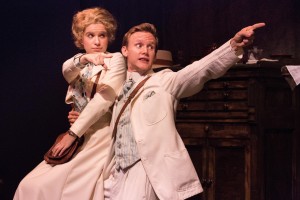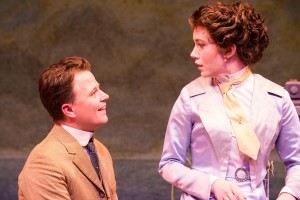The Pearl Theatre Company has launched its 30th season with George Bernard Shaw’s You Never Can Tell, co-produced by the Gingold Theatrical Group. From now through October 13th, five members of the Pearl resident company and four other actors, under the able direction of David Staller, are demonstrating how farce — manic and mechanical in the wrong hands — can be at once sidesplitting and poignant when tackled properly.
Shaw (1856-1950) began writing You Never Can Tell in 1895, when the public’s appetite for farce seemed insatiable. Charley’s Aunt by Brandon Thomas, the granddaddy of Victorian farces, was in the third year of its blockbuster London run; and just four months before, Oscar Wilde’s The Importance of Being Earnest: A Trivial Comedy for Serious People had taken the town by storm. In the Saturday Review, Shaw acknowledged Wilde’s technical flair but declared himself unstirred by Earnest: “It amused me, of course; but unless comedy touches me as well as amuses me, it leaves me with a sense of having wasted my evening.”
You Never Can Tell concerns the household of Mrs. Margaret Clandon (Robin Leslie Brown), a feminist author who long ago fled her autocratic husband (Bradford Cover), taking their three children to live on the island of Madeira. At the play’s outset, she and the children — Gloria (Amelia Pedlow) and twins Dolly and Philip (Emma Wisniewski and Ben Charles) — are back in England after 18 years as expatriates. Mrs. Clandon has chosen a seaside resort as their point of reentry, believing this the last place the family risks bumping into the estranged father about whom the children know nothing.
The imaginative universe of You Never Can Tell is every bit as topsy-turvy as the worlds of The Importance of Being Earnest and Charley’s Aunt. Shaw embraces the trappings of melodrama and farce — improbable coincidence, mistaken identities, disguises and chance reunions of lost relatives. His ingénue and juvenile fall in love at first sight, as they might in any West End vehicle of the day. But, in Shaw's hands, each scene is a full-out debate; and as the playwright once remarked, “every line has a bullet in it and comes with an explosion.” Shaw's rapid-fire dialectic transforms the hoary odds and ends of 19th century dramaturgy. The result is witty and psychologically complex with enough melancholy to make the characters and their emotional dilemmas believable.
Gloria, the ingénue of You Never Can Tell, is an exemplar of the late 19th century’s “New Woman,” thoroughly schooled in feminist ideals and determined to “obey nothing but [her] sense of what is right.” Her swain, Valentine (Sean McNall), is a roué and self-proclaimed “duelist of sex,” whose values are antithetical to Gloria’s strict moral code. The couple's sparring pits intellect against heart (and flesh); the swift, surprising reversals in tactical advantage between the romantic warriors reflect the mantra voiced by an omniscient waiter (Dan Daily): “You never can tell, sir: you never can tell.”
That mantra may seem as lighthearted as Wilde’s pun on the name Ernest. It points, however, to existential uncertainty, the uncontrollable nature of life itself. Near the end of the play, a barrister (Zachary Spicer), predicting what will happen to the lovers, speaks the evening's most memorable — and most dismal — line: “It’s unwise to be born; it’s unwise to be married; it’s unwise to live; and it’s unwise to die.” That vision is worlds away from Charley's Aunt; yet Shaw finds a satisfying balance between what's buoyantly old-fashioned in his comedy and the darker elements lurking beneath its bright, sparkling surface; and he rounds off the proceedings in a way that owes much to Shakespeare's romantic comedies.
The vocal fireworks of Shaw’s plays are no cakewalk for actors, especially when assumed accents are required; but every member of the spirited ensemble is up to the task. Staller, founder and artistic director of the Gingold Theatrical Group, keeps his players (handsomely costumed by Barbara A. Bell) in perpetual motion around a colorful environment, inspired by Art Nouveau and designed by Harry Feiner (scenery), Stephen Petrilli (lighting), and M.L. Dogg (sound). The high style of the show’s scenic conception and the well-calibrated irony of direction and performance (never devolving into camp) ensure that what’s silly in You Never Can Tell blends harmoniously with what’s serious.
You Never Can Tell is playing in the superbly-equipped theater on West 42nd Street to which the Pearl moved last season. For almost 30 years, this troupe occupied small venues in Chelsea, the East Village, and the basement of City Center. The current production vindicates all the toil, sweat, and money-raising of the Company's three-decade journey to its spacious new home.



